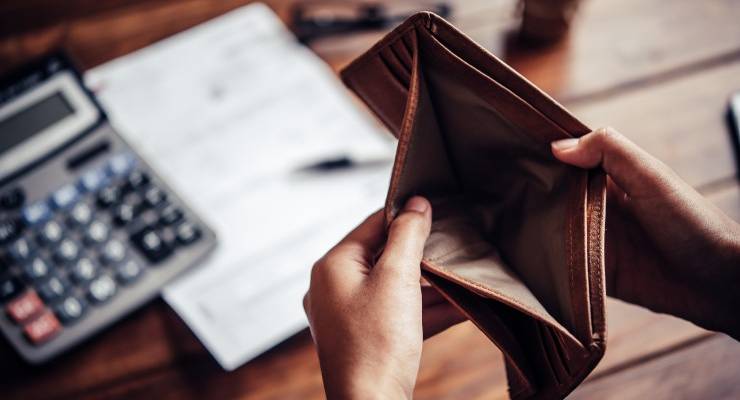
Wall Street has nosedived. Australian stocks have had their biggest daily drop since the crash of 1987, with the Aussie dollar hitting 11-year lows. The US economy is heading towards a recession.
It’s bleak news for Australia, which has already dealt with a slow economy and stagnant wages, summer bushfires and now coronavirus.
Crikey takes a look at what we can expect to see in a recession — and who it will hit the hardest.
Nothing we’ve seen before
Importantly, we don’t know for sure a recession will hit. Scott Morrison has signalled a second-round stimulus package which could help stave off a recession — though nothing is certain.
A report from advisory firm KPMG this week warned that the potential for a full-blown global economic crisis “is now very real”. The Australian economy could take a decade to recover, they warned.
We haven’t had a virus-induced recession in modern history, Peter Whiteford, a professor in the Crawford School of Public Policy, told Crikey.
“If there is a virus-induced recession then it will be very different from any other,” he said. While the effects of SARS and swine flu hit the world economy hard, China’s larger market share changes things.
“In most recessions, you want to keep people in work so they don’t become unemployed and get on benefits. In a pandemic, you don’t want people to go into work … you want them staying away from work for at least a fortnight,” Whiteford said.
If companies start downsizing and cutting staff, this could signal a deep recession. “People who lose their jobs don’t generally get the same jobs as before the bust. It has really long-term consequences.”
Danielle Wood, program director at Grattan Institute told Crikey unemployment has a “scarring” effect on a person’s career trajectory and would hit Australia’s youth the hardest.
“Employers will try to handle a downturn in business activity not by sacking but by reducing hours for existing employees, and by not hiring. This disproportionately affects young people who are trying to get into the labour market,” she said.
Poverty will get even worse
If the recession hits, poverty in Australia will increase dramatically, Woods said.
“People on Newstart are living below the poverty line, so the more people out of work, the more people on Newstart, the more people living in poverty,” she said.
Poverty in Australia is higher than the OECD average. A recent report by the Australian Council of Social Service found 13.6% of Australians live below the poverty line — when their household’s disposable income falls below one-half of the median household disposable income.
A coronavirus recession will mean more people struggling to pay for food, rent and bills — prompting the Western Australian government to announce that all household fees and charges — including electricity, water and vehicle registration — will be frozen as part of the state’s stimulus package.
“We need to do more of this,” Woods said.
“Anecdotally, we’re hearing commercial rents are coming down as property owners realise companies are taking a hit,” she told Crikey. “Some people won’t be able to pay, and some landlords will accept a deferral or lower rent.”
A spike in inequality
But those living on Newstart won’t be the only ones affected — let’s shed a tear for the high rollers too.
“Often, people at the top do badly during an economic downturn. It wipes a lot off from the financial market, and disproportionately affects the top 20% of earners,” Woods explained.
This time, though, it’s different: the ones first and worst affected are still casual employees. “A quarter of Australia’s workforce is casual — they’ll be the first to lose their jobs in a downturn, and we’re already seeing that,” Woods said.
Australia is pretty close to the OECD average for levels of inequality, though it fluctuates, Whiteford told Crikey. Inequality was at its peak in the lead up to the global financial crisis — and flattened out afterwards before slowly creeping up to where it is today.
“Part of the reason why inequality stabilised after the GFC was thanks to the Rudd government’s massive increase in age and disability pensions,” Whiteford said.
Aside from one-off stimulus payments for pensioners and Newstart recipients, a permanent increase has been ruled out — meaning inequality in Australia is likely to creep up as the coronavirus spreads.








How long did the recession last after the Spanish influenza of 1918-20 (a much more serious pandemic that killed 50-100 million in a global population of less than 2 billion)? Not very long. The Roaring Twenties followed, an era of exuberance and optimism. The Great Depression happened in 1929 as a result of bad economic decisions such as dropping interest rates too low and encouraging stock market speculation, and Winston Churchill’s decision to return to the gold standard.
The negative societal affects of Newstart reach much further than the immediate recipients.
It’s not just the people on Newstart that are doing it tougher than they should in our otherwise “affluent society” – their families (especially those on fixed incomes/pensions), helping out with cash (so that their kids on that “welfare” can eke by) are also going without.
This government couldn’t care less about inequality and those living below the poverty line. The poor are just fodder, who must work for the increasing wealth of the 10% on top…so they can acquire even more riches.
Disgusting!!
“Importantly, we don’t know for sure a recession will hit.”
Can I get any money on it? It’s a certainty. Nothing can stop it.